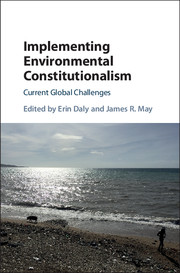Book contents
- Implementing Environmental Constitutionalism
- Implementing Environmental Constitutionalism
- Copyright page
- Dedication
- Epigraph
- Contents
- Figures
- Tables
- Contributors
- Foreword
- Introduction
- Part I Themes and Structures of Environmental Constitutionalism
- 1 Six Constitutional Elements for Implementing Environmental Constitutionalism in the Anthropocene
- 2 Implementing Substantive Constitutional Environmental Rights
- 3 Implementing Constitutional Environmental Rights in the Amazon Rainforest
- 4 Climate Change and Environmental Constitutionalism
- 5 Natural Resources, Power Sharing, and Peacebuilding in Postconflict Constitutions
- Part II Geographies of Implementation
- Index
1 - Six Constitutional Elements for Implementing Environmental Constitutionalism in the Anthropocene
from Part I - Themes and Structures of Environmental Constitutionalism
Published online by Cambridge University Press: 02 November 2018
- Implementing Environmental Constitutionalism
- Implementing Environmental Constitutionalism
- Copyright page
- Dedication
- Epigraph
- Contents
- Figures
- Tables
- Contributors
- Foreword
- Introduction
- Part I Themes and Structures of Environmental Constitutionalism
- 1 Six Constitutional Elements for Implementing Environmental Constitutionalism in the Anthropocene
- 2 Implementing Substantive Constitutional Environmental Rights
- 3 Implementing Constitutional Environmental Rights in the Amazon Rainforest
- 4 Climate Change and Environmental Constitutionalism
- 5 Natural Resources, Power Sharing, and Peacebuilding in Postconflict Constitutions
- Part II Geographies of Implementation
- Index
Summary
Information
- Type
- Chapter
- Information
- Implementing Environmental ConstitutionalismCurrent Global Challenges, pp. 13 - 33Publisher: Cambridge University PressPrint publication year: 2018
